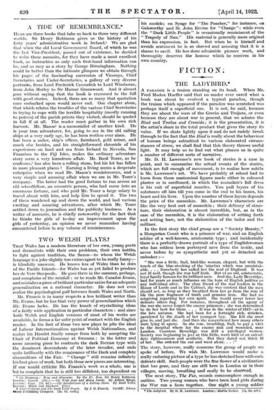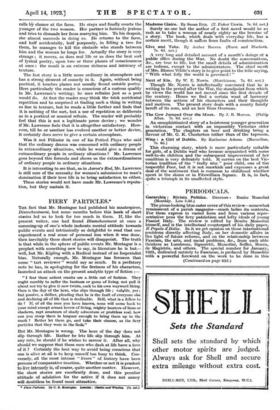FICTION;
THE LADYBIRD.*
A PARADOX is a truism standing on its head. When Mr. Ford Madox Hueffer said that no reader ever cared what a book was about he evolved a typical paradox, though the truism which appeared if the paradox was scratched was perhaps itself a superficial one. It is not, he said, because they are about the wars of the Greeks and Trojans, or even because they are about war in general, that we admire the Iliad and Troilus and Cressida; it is the presentation, it is the artist's share in the total product that giyes the story its value. If we skate lightly upon it and do not rudely break through to the fact that the Iliad is really about the behaviour of human beings submitted to various elaborated circum- stances of stress, we shall find that this theory throws useful light. It may help us to find out what pleases us in quite a number of different sorts of narrative.
Mr. D. H. Lawrence's new book of stories is a case in point, and to summarize the actual events of the stories, which are full enough of movement, is to realize how subtle is Mr. Lawrence's art. We have probably at school had to learn from those anatomical figures made either in coloured plaster or in cardboard, in which the mannikin's full dress is his suit of superficial muscles. You pull layers of his substance off him till you come in the end to his bones, his heart and his liver. Upon the number of these layers depends the price of the mannikin. Mr. Lawrence's characters are like the very best sort of mannikin ; their delicacy of struc- ture, their elaboration is almost incredible, but, as in the case of the mannikin, it is the elaboration of setting forth and setting bare, not the elaboration of the tailor and the milliner.
In the first story the chief group are a " Society Beauty," a Hungarian Count who is a prisoner of war, and an English soldier of a well-known, aristocratic type ; and incidentally there is a perfectly-drawn portrait of a type of Englishwoman who has seldom been portrayed save from the inside, and never before by so sympathetic and yet so detached an onlooker :—
" She was a little, frail, bird-like woman, elegant, but with the touch of the blue-stocking of the 'nineties which was unmistak- able. . . . Somebody has called her the soul of England: It was not ill said, though she was half Irish. But of an old, aristocratic, loyal family famous for its brilliant men. And she, Lady Beveridge, had for years as much influence on the tone of English polities as any individual alive. The close friend of the real leaders in the House of Lords and in the Cabinet, she was content that the men should act, so long as they breathed from her as from the rose of life the pure fragrance of -truth and genuine love. She had no misgiving regarding her own spirit. She would never lower her delicate silken flag. For instance, throughout all the agony of the war she never forgot the enemy prisoners ; she was determined to do her best for them.. . . It was in the winter of 1917—or in the late autumn. She had been for a fortnight sick, stricken, paralysed by the death of her youngest boy. She felt she must give in, and just die. And then she remembered how many others were lying in agony. So she rose, trembling, frail, to pay a visit to the hospital where lay the enemy sick and wounded, near London. Countess Beveridge was still a privileged woman. Society was beginning to jeer at this little, worn bird of an out-of- date righteousness and aesthetic. But they dared not think ill of her. She ordered the car and went alone. . . ."
The story, however, really concerns the group of people we spoke of before. We wish Mr. Lawrence would make a
really enduring picture of a type he has sketched here with such delicate skill. Such people were the fine flower of a civilization
that has gone, and they are still here in London or in their villages, moving, breathing and easily to be observed.
The next -story, The Fox, sounds commonplace enough in outline. Two young women who have been land girls during the War run a farm together. One night a young soldier • The LadyNnt. 'By -D. H. Lawrence. Loudon :-MartIn Seeker. IN Od. net.] calls by chance at the farm. He stays and finally courts the younger of the two women. Her partner is furiously jealous and tries to dissuade her from marrying him. To his despair, she almost succeeds in doing so. He returns to the farm, and half accidentally, half purposely, in felling a tree for them, he manages to kill the obstacle who stands between him and the woman he longs for. Actually the story is very strange ; it moves, as does real life or as does the best sort of lyrical poetry, upon two or three planes of consciousness at once : the result is an extreme richness and intricacy of texture.
The last story is a little more ordinary in atmosphere and has a strong element of comedy in. it. Again, without being poetical, it touches planes not usually found outside poetry. Here particularly the reader is conscious of a curious quality in Mr. Lawrence's writing; he uses refrains just as a poet would do. At first the reader may think the trick accidental repetition and be surprised at finding such a thing in writing so fine in texture, but he reads a little further and finds that it is nothing of the sort, but a use of repetition as deliberate as in a poetical or musical refrain. The reader will probably feel that this is not a legitimate prose device ; we wonder if Mr. Lawrence feels that it is altogether satisfactory. How- ever, till he or another has evolved another or better device, it certainly does serve to give a certain atmosphere.
Was it. not. Pelissier in, one of his Potted Plays who said that the ordinary drama was concerned with ordinary people in extraordinary situations, while he would give a drama of extraordinary people in ordinary situations.? Mr. Lawrence goes beyond this formula and shows us the extraordinariness of ordinary people in ordinary situations.
It is interesting to see that, as in Aaron's Rod, Mr. Lawrence is still sure of the necessity for women!s. submission to man's domination if their love life is, to bring satisfaction to either.
These stories would not have made Hr. Lawrence's reputa- tion, but they sustain it.











































 Previous page
Previous page